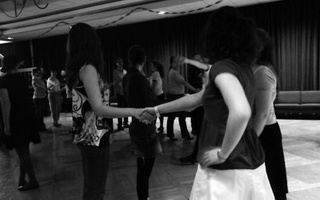Shakira’s latest album, “Sale el Sol,” is a stroll down memory lane. Sung primarily in Spanish, her seventh record is strongly reminiscent of some of her past artistic endeavors, like “Oral Fixation.” As a whole, the album is based on a mixture of Latin and rock n’ roll influences. Through this range of interests, Shakira showcases her ability to captivate many different audiences. Although this sometimes means that the album lacks a truly cohesive thread, it does offer fans a taste of what Shakira is most famous for: sensational and vibrant songs.
Shakira’s Latin influences are apparent in tracks like “Addicted to You,” which starts with the recognizable beat most commonly found in merengue, a style of Latin American music. It is further reinforced by the instruments used—maracas and trumpets—which are the staples of the Latin style. Even the choice of language speaks to its genre, as the only phrase in English in this whole song is in the chorus, “Baby, I’m addicted to you.” The album also has other, various types of Latin American music including reggaeton. In “Gordita,” Shakira collaborates with the band Residente Calle 13, a famous of reggaeton bands. In this way, the album orients itself towards Shakira’s Spanish audience.
“Sale el Sol” also tries to cater to those fans that love her previous, more rock infused albums like “Oral Fixation.” Through tracks like “Antes de las Seis” and “Devocion”, Shakira explores her folk and rock roots. The piano and guitar that accompany Shakira in “Antes de las Seis,” for example, bring out a different side of her vocals. Unlike “Addicted to You” and songs of that ilk, Shakira’s signature vocal style shines through aided by the different instrumentation. The more rock n’ roll songs also display more soulful, serious lyrics. “Lo que mas,” is about an overwhelming love that falls apart. The piano’s melody enhances the regret and sorrow Shakira expresses with her vocals.
However, without any smooth transitions, the album jumps to a more playful pop song, “Mariposas.” While the variety of music in the album is at times refreshing, it depreciates the album as a whole. Instead of presenting a unified theme, “Sale el Sol” seems more like a jumble of songs evoking different periods from Shakira’s career. The eclectic nature of this album does serve well for certain individual songs like “Waka Waka,” the official song of the 2010 FIFA World Cup in South Africa. In order to create an authentic anthem for the South African games, Shakira collaborated with the South African group Freshlyground. By basing the chorus off of a 1986 Cameroonian hit song, Shakira tries to stay true to the host continent while still incorporating instruments and sounds from around the world.
The first single of the album, “Loca” also stands out from the pastiche of other genres since it’s more in line with her recent, well-known singles. With a combination of Latin rhythm and rap, “Loca” has an undeniable potential for reaching a popularity the likes of “Hips Don’t Lie.” Shakira collaborates with Dizzee Rascal, a British rapper, who adds his own refreshing blend of rap and hip hop to the mix. Since the lyrics are divided more equally between English and Spanish compared to other songs in the album, “Loca” will likely be more appealing to English-speaking audiences.
On their own, the songs in “Sale el Sol” demonstrate Shakira’s diverse talents. However, her ambition to incorporate her many different styles into one album ultimately proves too distracting. The range of genres that try to please the diverse groups among her fans results in a lack of cohesion. Hopefully, “Sale el Sol” is just a stepping-stone for Shakira’s next, more focused project.
Read more in Arts
‘Witmark Demos’ a Distillation of the Folk AestheticRecommended Articles
-
ShakiraA 10-years younger Shakira appears on the cover of “¿Dónde Están los Ladrones?”—the Spanish-language album that fixed for a permanent ...
-
Shakira Named Harvard Foundation Artist of the YearShakira has been named the 2011 Artist of the Year by the Harvard Foundation of Harvard University, according to a press release this evening.
-
Pop Screen: The Logic of "Loca"Shakira’s newest music video, the English version of “Loca” featuring Dizzee Rascal, is the type that, if played at a ...
-
Crazy Ex-GirlfriendI’m starting to feel just a little abused like a coffee machine in an office. This is pathetic and sardonic. ...
-
 Teach Me How...
Teach Me How... -
 Ana L. Reyes
Ana L. Reyes














